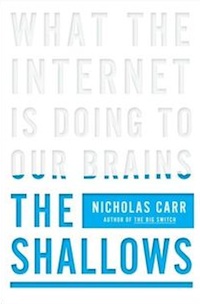Our Brave, Stupid New World

Reading Agni editor and Harvard mentor (The Gutenberg Elegies: The Fate of Reading in an Electronic Age) Sven Birkets at his best is like listening to an old-style baritone crooner like Johnny Hartmann squeeze every last nuance from a classic ballad.
The occasion for this observation is Birket’s meditation (lots of writers fashion personal essays, Sven spawns meditations) in the recent edition of the American Scholar entitled “Reading in the Digital Age”, described as “notes on why the novel and the internet are opposites, and why the latter both undermines the former and makes it more necessary.” Which is itself a response to a number of magazine articles, including a two-year-old Atlantic Monthly piece by Nicholas Carr, “Is Google Making Us Stupid?”
Now concomitant with Birkerts we note the publication of The Shallows: What the Internet Is Doing to Our Brains (WW Norton), in which Nicholas Carr expands his investigation of this still juicy and I fear irresolvable subject—as it is an ontological issue (as least that’s how I view it), resolution is not easily (if at all) achievable.
Here’s Birkets:
The Atlantic
When carried into the realm of the intellect, the industrial ideal of efficiency poses, as Hawthorne understood, a potentially mortal threat to the pastoral ideal of contemplative thought. That doesn’t mean that promoting the rapid discovery and retrieval of information is bad. It’s not. The development of a well-rounded mind requires both an ability to find and quickly parse a wide range of information and a capacity for open-ended reflection. There needs to be time for efficient data collection and time for inefficient contemplation, time to operate the machine and time to sit idly in the garden. We need to work in Google’s “world of numbers,” but we also need to be able to retreat to Sleepy Hollow. The problem today is that we’re losing our ability to strike a balance between those two very different states of mind. Mentally, we’re in perpetual locomotion.
Sven Birkets concludes:
Concentration is no longer a given; it has to be strategized, fought for. But when it is achieved it can yield experiences that are more rewarding for being singular and hard-won. To achieve deep focus nowadays is also to have struck a blow against the dissipation of self; it is to have strengthened one’s essential position.
I leave it to you to review Carr’s warning bulletin from the Atlantic. Or even have a go at his cautionary new opus, which may in its way be a test case of the concerns it voices.
